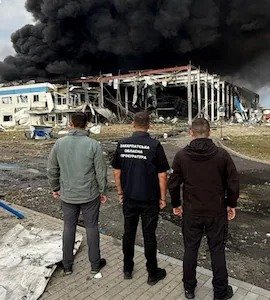Before dawn on Thursday, two Russian cruise missiles struck an American-owned electronics factory in Mukachevo, a town in far western Ukraine near the Hungarian border, leaving widespread destruction and more than a dozen people injured. The attack marked one of the most serious incidents in the region, which had previously been considered safer than much of Ukraine’s war-torn east and south. Ukrainian authorities reported that the strike hit a facility owned by Flex, a U.S.-founded multinational electronics manufacturer. The Mukachevo plant, in operation since 2012, produces consumer household goods such as coffee machines and small appliances. Officials stressed that the factory had no military function.
President Volodymyr Zelensky confirmed that at least 15 people were injured in the attack. In a post on Telegram, he condemned Moscow’s decision to target what he described as “an ordinary civilian enterprise, an American investment.” He noted that the strike underscored Russia’s continued disregard for international appeals to end its full-scale war in Ukraine. “They produced such familiar household items as coffee machines,” Zelensky said. “Russia delivered this strike as if nothing had changed at all, as if there were no global efforts to stop this war.”
The missile strike was part of a larger overnight assault. Ukrainian officials said Russia launched more than 570 drones and 40 missiles across multiple regions in the same wave of attacks, overwhelming air defenses and causing damage to energy facilities, infrastructure, and civilian industries. The attack on Mukachevo drew particular international attention because of the American ownership of the factory, which raised concerns about the safety of foreign investments in Ukraine.
The factory belongs to Flex, a publicly listed company on NASDAQ with joint headquarters in Austin, Texas, and Singapore. With over 100 facilities worldwide, Flex is one of the largest contract electronics manufacturers globally. Its Mukachevo plant has employed thousands of local workers over the years, contributing significantly to the local economy. The strike destroyed a large part of the facility, though Ukrainian officials said rescue efforts and damage assessments were still underway.
Western analysts noted that hitting a U.S.-owned facility could further strain relations between Washington and Moscow. While Russia has routinely targeted Ukraine’s defense and energy industries, attacks on foreign-owned civilian businesses could be seen as a deliberate escalation. U.S. officials have not yet issued a formal statement on the Mukachevo strike, but previous attacks on civilian infrastructure have been condemned as violations of international law.
The Zakarpattia region, where Mukachevo is located, had until recently been considered relatively safe compared to eastern and southern battlefronts. Many Ukrainians displaced from other regions had sought refuge there, believing it to be beyond the reach of Russian missiles. Thursday’s strike demonstrated that no part of Ukraine is entirely shielded from long-range attacks.
For Kyiv, the incident highlights both the resilience and vulnerability of its economy. Despite ongoing war, multinational companies such as Flex have continued operating in Ukraine, providing jobs and sustaining exports. Strikes on such facilities not only threaten civilian lives but also risk deterring foreign investment critical to Ukraine’s recovery.
The attack comes as global attention remains focused on efforts to bring Russia and Ukraine to the negotiating table. Zelensky has repeatedly stated that peace is only possible if Moscow withdraws its forces and ceases targeting civilian infrastructure. Russia, meanwhile, continues to insist its strikes are aimed at weakening Ukraine’s defense capacity, though international observers have documented repeated hits on civilian targets.
As Mukachevo begins to recover from the destruction, images of smoke rising over the ruined factory have circulated widely, symbolizing the far-reaching consequences of Russia’s war. For many in Ukraine, the attack is yet another reminder that even communities far from the front lines remain at risk, and that civilian industries continue to be caught in the crossfire of a conflict now in its fourth year.







